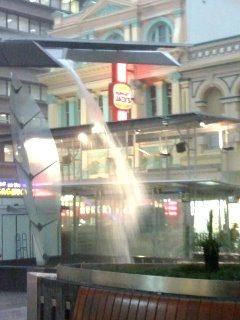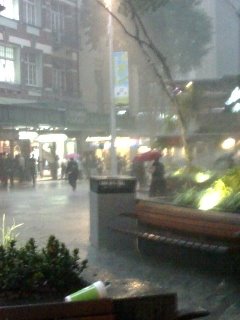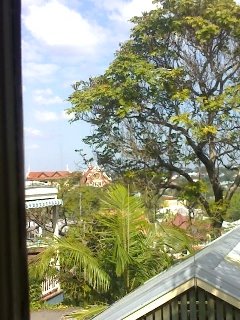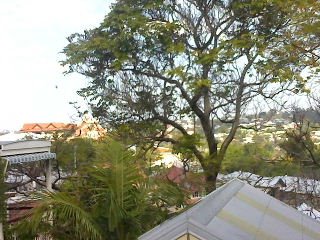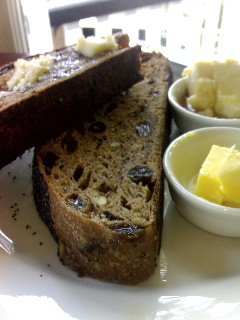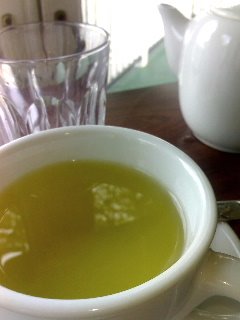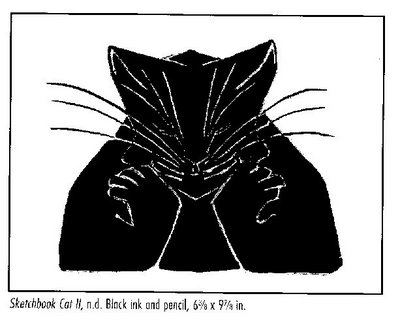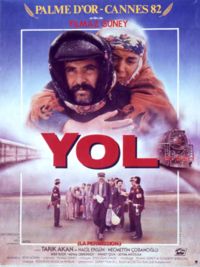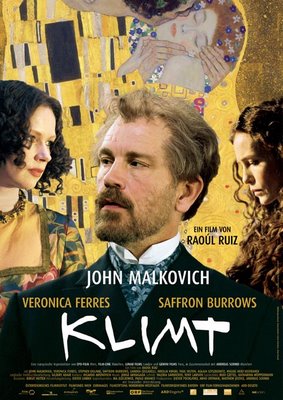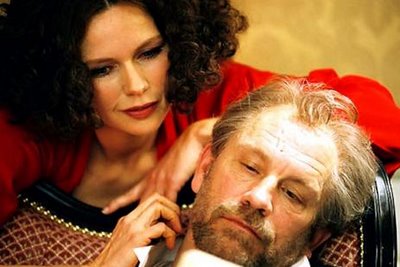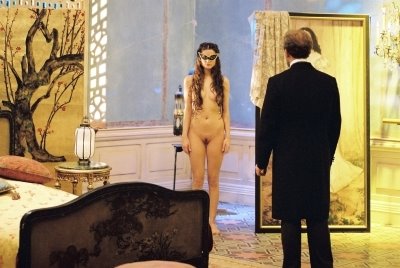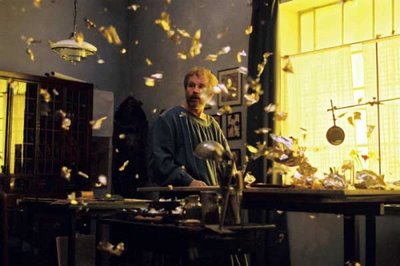How does it happen? How can someone who spends their days reading, taking notes, and writing, find themselves at a bus stop, bursting with ideas 4 a blog post, only 2 find themselves without a pen? I’ve resorted 2 using the draft msg mode on my mobile. Picture me eating strawberries frm a punnet in my shopping bag, as I sit on a bench and compose these thoughts. I wonder how big the msg will b allowed 2 get? And what’s with more public transport entries when I announced the last instalment yesterday? Fear not, that was the last of the p/t rants, this is in fact a post on Big Brother. I shld probably write about something more worthy, like the stoush on the Cultural Studies List, but dogpossum...At this point I got sick of texting, and since I was already on the bus by the time I asked you to picture me sitting on a bench eating strawberries, well, there really seemed to be no point continuing the post that way. I would have been home and ready for bed by the time I finished writing what I had to say by means of text messaging. Tomorrow I will endeavour to take my personal organiser with me on my travels—it has two pen holders and lots of yellow notepaper.
So, there’s a stoush going on at the
Cultural Studies List in response to an
Op Ed piece in
The Australian by Emma Dawson. I am tired of
The Australian on all sorts of levels, between the
Patrick White punk they pulled on Australian publishers and now more of their usual ‘cultural studies scholars speak another language’ guff, well, I am just bored by their disingenuous stoking of ‘debates’, which merely serve their ongoing campaign to undermine the nation’s humanities researchers and educators in order to shore up their own position as the arbiter of all things cultural. Snore.
I was having a bit of a read of Alison Croggan’s blog,
Theatre Notes, where
she and her commenters lamented the direction of
The Age’s arts coverage. Chris Boyd noted that for him, the paper has become increasingly irrelevant as a source for information and discussion of the arts in his home town. And I have to say that’s how I feel about
The Australian on any topic. Truth be told, I only buy
The Weekend Australian for the TV guide in the ‘Review’ insert—because I will not pay one red cent for the guide in
The Sunday Mail, the weekend version of
The Courier Mail a.k.a The Curious Snail—and the Victoria Roberts comics in the Magazine.
I wish we could ignore
The Australian, but the trouble is that its strategy is such that the ‘evidence’ it offers to ‘prove’ the demise of our cultural identity, due to the apparently incomprehensible theorising of cultural studies and other humanities scholars, provides all the justification that governments need to interfere in the budgets and curricula of humanities institutions.
I liked Danny Butt’s contribution to the debate*, where he questioned the scope of the public that was implicit in Dawson’s piece. It’s really a public that only encompasses the pages of
The Australian; it doesn’t account for the academics who routinely communicate on subjects of relevance to their work in discussions on radio and some television programmes. Butt pointed out that
The Australian’s public ignores the everyday communication of theoretical work that goes on in universities between lecturers, tutors and students. It completely ignores the vociferous discussion that occurs on the comments pages of blogs where the writers and contributors (on group blogs) are scholars of all kinds and the readers are too, a fact which further makes Amanda Wiseman’s point that you don’t have to be a Cultural Studies academic to be interested in Theory or want to talk about matters of national importance in a way that recognises the complexity of the issues at hand.
Anyway, I didn’t mean to talk about this at all. I feel as though I always struggle to grasp the breadth of the issues that should be worked through to offer any coherent contribution to these kinds of debates. I am in awe of those who can organise their thoughts into a semblance of order. Two such people who have synthesised the discussion and issues at hand in a very temperate and intelligent manner are
dogpossum and Tseen from
Banana Lounge. Read their summaries and thoughts.
To the topic at hand then:
Big Brother. I wasn’t too happy that Jamie won. For me, as soon as Claire and David were ousted, that Camilla should win was a no-brainer. When will I learn? The affable types always triumph. Still there was some consolation that the vote was so close. And, hooray, that John and Ash, who had been removed from the house, weren’t there as part of the finale; the lawyers from both sides probably made sure of that, so we can be thankful to them. John and Ash’s presence would have been too creepy. It was bad enough that Michael dared to show his face. The audience booed him! My goodness. And still he did that stupid Johnny Fairplay gesture, as if it were some badge of honour, rather than marking him as someone who needs to work on being a lot more humble. Maybe Michael will become a pro-wrestler in the same way that the miscreant he so admires did after
Survivor. That would save us all from having to put up with the ill-effect that any realisation of his political ambitions would surely have.
Upon reflection, I think this was one of the better years of
Big Brother. Even as a fairly avid viewer—although only of the PG-rated programmes—I was surprised by how much
I enjoyed the final show. In previous years I have flicked between the finale and whatever programmed happened to be screening at the same time on another commercial station. I was interested to see that the housemates were thanked by ‘Big Brother’ for their contribution to the programme and especially the point that they had made themselves vulnerable to criticism by participating. Whether you agree or not that the participants are due any charity for volunteering to be housemates, it is certainly true that being a
Big Brother contestant is to attract some of the most vehement assassinations of your character. Take this comment from Elizabeth Meryment in the ‘Review’ supplement of T
he Weekend Australian: ‘we are drawing to the close of yet another of this rather tawdry series in which some truly vile individuals ... are placed in a house together...’ I don’t know where anyone gets the conviction to so thoroughly dismiss another human being—one they’ve only seen on television!—in such a cavalier manner. As for what Meryment writes about Gretel... I’m obviously watching a different Gretel to everyone else. I find her quite funny. Really. I don’t think she deserves to be fired because she has a lot of bad hair days, or perhaps isn’t ageing in an acceptable way. I do think that she and Gaelen were separated at birth; was anybody else struck by how similar their features are?.
I’ve come full circle, almost. I’m back to not liking
The Australian. I could go on, but I will leave my tirade against the calibre of television criticism in that newspaper for another day. (The fact that there is no ‘Television’ section on the side bar of their website, that links to their reviews and discussions of the programmes, is indicative, I think, of their low-esteem for the medium).
* This is an excerpt from Butt’s post. I tried to find a link, but couldn’t figure it out:
‘[L]et's talk about this "out there" or "public" where our intellectual work is supposed to have an impact. If Dawson's underlying point is that we need to find greater public impact for our work, I'll say, "Of course, what are you doing a PhD for if you want to write op-ed for the Australian then?". It's like getting an computer science degree to retail computers. That's not saying the Australian doesn't have an impact, but it's through the reflection/refraction of sentiment, rather than evidence-based intellectual argument of the kind academics are trained for (and I think the real transformations of people's imaginations through the press come in feature writing, rather than op-ed, though I think op-ed can have a useful "disrupting storylines" capability when done well). The press is also seductive in its reach, yet impossible to gauge in its real impact, so it's the perfect domain for academics to project their fantasies about changing the world. It's dangerously overrated by CS as a sphere, in a way that only seems to feed the anxieties Dawson and other postgrads are expressing about the field.
I know plenty of people trained in cultural disciplines by the academy who have a massive impact on the "public out there" - they work in policy. I think educators would do well to steer students who
want to affect the public in a general way into that domain. Most would quickly realise they've become too busy with real politics to worry about people writing theory :7. I do policy work occasionally, and it's hard and frustrating and makes me realise I'm much better at other kinds of textual work. But because it's attached to law/resources, the effects are real. In policy/govt. there is an actual political mechanism determining "the common", rather than just a vague sense that your writing should conform to a certain style to be politically effective. I think that lack of confidence in the "publicness" of that style is a part of the resentment and anxiety over theory comes from the chattering classes.
At the other end of the scale, the other place you know your work can have an impact is in teaching. The feedback on your performance is measurable. Whenever I run facilitation exercises where non-academics talk about significant events in their lives, I get surprised at how many will talk about experiences where a teacher inspired them or shifted their thinking. They don't talk about what they read in the paper. Personally, I think that individual good teachers I know have had more of a transformational impact on "culture" than Keith Windschuttle, and that makes me happy. Personal interaction might seem marginal to the "public", but what it lacks in scale, it makes up for in depth, impact and longevity. I'll always forward that against the ivory tower argument, and I miss teaching for that reason.
If you want to talk about *writing* (which is ultimately what Dawson was talking about: language, not real political impact), then your style reflects your own capability and the forum you're working in, and hopefully as an academic or media professional you learn that those are going to be different depending on the circumstance.’
